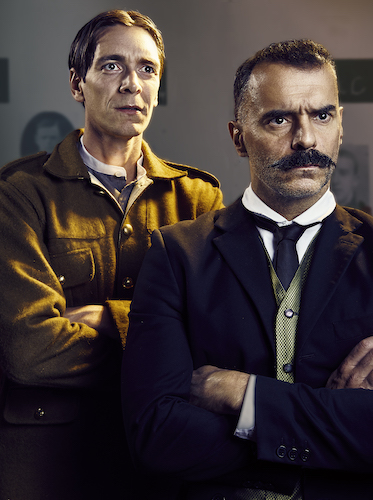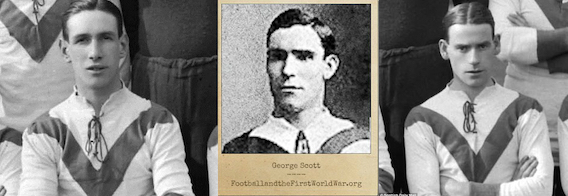Theater Review: “The Greater Game”, Starring James Phelps
Sitting down to write this review, the first thing I want readers to know is that The Greater Game, written by Michael Head, is a true story. The play honors a group of English footballers who fought both on the field and for their country in the Battle of the Somme. The play follows seven teammates from Leyton Orient (known then as Clapton Orient) and their manager Billy Holmes, portrayed by Michael Greco. James Phelps, who portrays Richard McFadden, speaks of the importance of this:
When I heard it was a true story I went home and googled it to find out more; that’s when it really hit home. This play is their story and I wanted to do it justice.

Sitting in the theater, I noticed the set is minimal and staged as a football club dressing room: hooks with each player’s name above them, photos lining the wall of those who signed up as part of the war effort, and a long bench. This alone should signify to anyone in the audience that this play doesn’t need flashy staging – the characters are all we need on this journey.
Addressing the audience, Billy Holmes sets the scene as the first half gives us a glimpse into the lives of the men. We learn about the double act of Richard McFadden and William Jonas, portrayed by Steven Bush, as we start on our journey. It’s clear to everyone in the audience there is a real connection between the two actors – both Bush and Phelps bounce off each other like they have known each other for years.
As we get to know the other teammates, team captain Fred “Spider” Parker, portrayed by Jack Harding, becomes part narrator in the second half of the play. After we have got to know each player, laughed at the banter, and understood the dynamics of the group, the team is sent off to the trenches. Every single cast member shines out. Their portrayals are rich and multilayered. I felt like I personally knew every character, forgetting I was in a theater watching this story unfold.
I don’t think I stopped crying for longer than five minutes in the second half. Yes, the story on its own is horrifying, but this cast brought something different to the history. They brought raw emotion, their voices cracked, and the tension was palpable in the audience. As someone who is far removed from any conflict, it opened my eyes to the cost of war, the lives it destroyed, and the emotional toll it took on future generations. I’ll be honest: I wasn’t prepared for the emotional response I had, but I wasn’t alone. Phelps commented that director Adam Morley “had trusted us” to find the emotion and connect with each other, and it’s clear that this has worked and created a powerful team spirit onstage.
McFadden was often the voice of reason, speaking openly about the horrors he saw and moral anguish he felt fighting. He desperately tried to make some sense of the world in a time period where there seemed no logic to the war, and it echoed around the room.
Having seen how much emotion was put into every moment, I asked Phelps how the cast was dealing with the pressure of doing this every night:
We want to keep the level of energy up, so I’m doing a lot of running and some boxing. It does take a lot out of me each night, but this is what it deserves. We work really well as a cast and we all know when we need space and when we need to support each other. Even when to give each other a little cuddle!
I don’t want to take the power away from this play by revealing the ins and outs of the story. Instead, I want people to go see this play, give them the audience they deserve, and remember these heroes.
The Greater Game is running from October 30 until November 25 at the Waterloo East Theatre as part of the Football Remembers 100 years initiative. Tickets cost £22/£19 concessions and are available to buy here.

William Jonas, George Scott, and Richard McFadden

